Nissan Juke VS VW ID.7 – Specs, Efficiency & Price Comparison
Find out now which car fits your needs better!
The Nissan Juke (SUV) is powered by a Petrol or Full Hybrid engine and comes with a Manuel or Automatic transmission. In comparison, the VW ID.7 (Hatchback) features a Electric engine and a Automatic gearbox.
When it comes to boot capacity, the Nissan Juke offers 422 L, while the VW ID.7 provides 532 L – depending on what matters most to you. If you’re looking for more power, you’ll need to decide whether the 143 HP of the Nissan Juke or the 340 HP of the VW ID.7 suits your needs better.
There are also differences in efficiency: 4.70 L vs 13.60 kWh. In terms of price, the Nissan Juke starts at 21400 £, while the VW ID.7 is available from 46300 £.
Compare all the key specs now and find out which model fits your lifestyle best!
Nissan Juke
The Nissan Juke stands out with its distinctive design and bold styling, making it a popular choice for those seeking something different on the road. Its interior cleverly combines modern technology with comfort, offering an enjoyable driving experience for both the driver and passengers. Despite its compact size, the Juke provides a surprising amount of space and versatility, making it suitable for urban adventures and weekend getaways alike.
details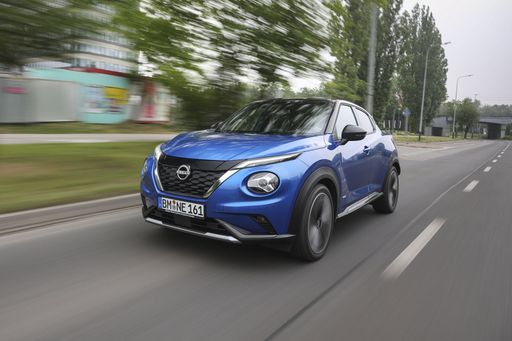 @ germany.nissannews.com
@ germany.nissannews.com
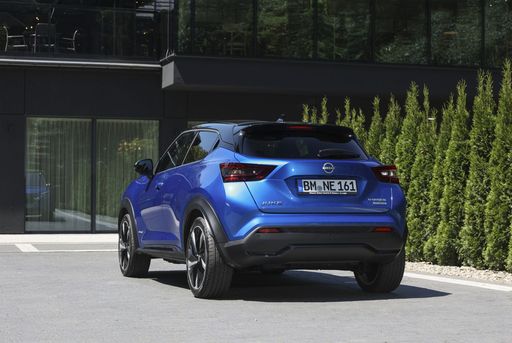 @ germany.nissannews.com
@ germany.nissannews.com
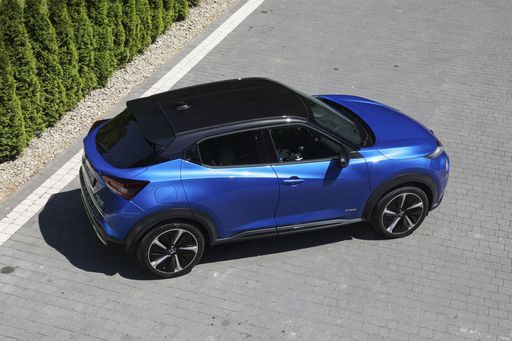 @ germany.nissannews.com
@ germany.nissannews.com
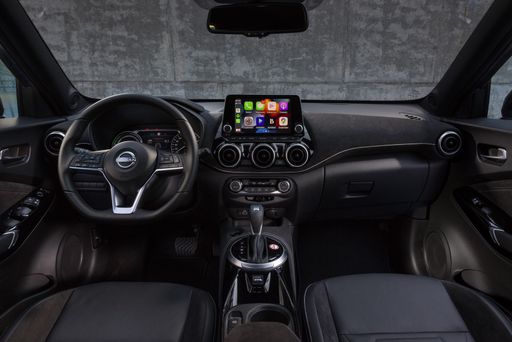 @ germany.nissannews.com
@ germany.nissannews.com
VW ID.7
The VW ID.7 represents a significant step forward in Volkswagen's electric vehicle lineup, offering an elegant design combined with advanced technology features. This electric saloon showcases a sleek aerodynamic profile, prioritising both performance and efficiency. Inside, drivers will appreciate the spacious and modern cabin, equipped with intuitive controls and connectivity features for a seamless driving experience.
details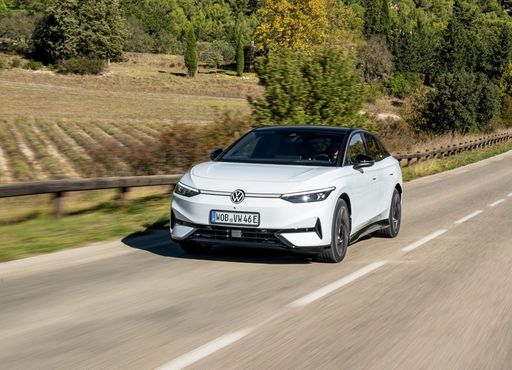 @ Volkswagen.de
@ Volkswagen.de
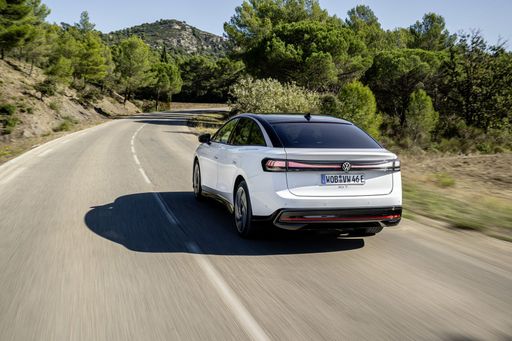 @ Volkswagen.de
@ Volkswagen.de
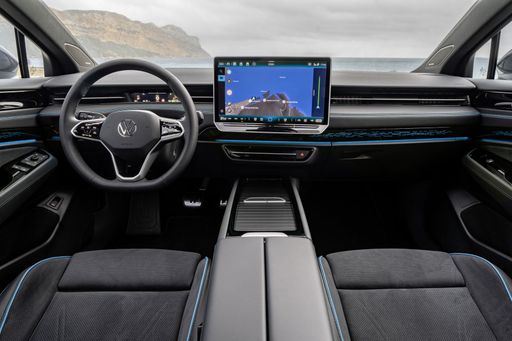 @ Volkswagen.de
@ Volkswagen.de
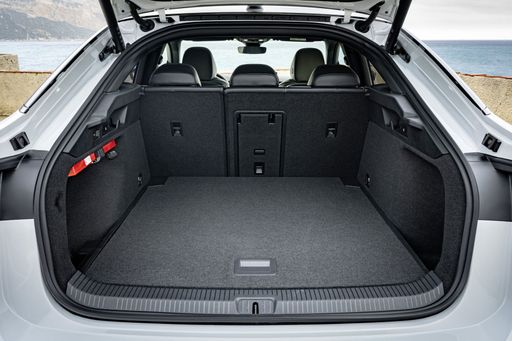 @ Volkswagen.de
@ Volkswagen.de

|

|
|
|
|
Costs and Consumption |
|
|---|---|
|
Price
21400 - 30100 £
|
Price
46300 - 54100 £
|
|
Consumption L/100km
4.7 - 6 L
|
Consumption L/100km
-
|
|
Consumption kWh/100km
-
|
Consumption kWh/100km
13.6 - 16.2 kWh
|
|
Electric Range
-
|
Electric Range
595 - 709 km
|
|
Battery Capacity
0.60 kWh
|
Battery Capacity
77 - 86 kWh
|
|
co2
107 - 136 g/km
|
co2
0 g/km
|
|
Fuel tank capacity
46 L
|
Fuel tank capacity
-
|
Dimensions and Body |
|
|---|---|
|
Body Type
SUV
|
Body Type
Hatchback
|
|
Seats
5
|
Seats
5
|
|
Doors
5
|
Doors
5
|
|
Curb weight
1274 - 1405 kg
|
Curb weight
2184 - 2328 kg
|
|
Trunk capacity
354 - 422 L
|
Trunk capacity
532 L
|
|
Length
4210 mm
|
Length
4961 mm
|
|
Width
1800 mm
|
Width
1862 mm
|
|
Height
1593 mm
|
Height
1535 - 1536 mm
|
|
Payload
405 - 427 kg
|
Payload
456 - 462 kg
|
Engine and Performance |
|
|---|---|
|
Engine Type
Petrol, Full Hybrid
|
Engine Type
Electric
|
|
Transmission
Manuel, Automatic
|
Transmission
Automatic
|
|
Transmission Detail
Schaltgetriebe, Automat. Schaltgetriebe (Doppelkupplung), Automatikgetriebe
|
Transmission Detail
-
|
|
Drive Type
Front-Wheel Drive
|
Drive Type
Rear-Wheel Drive, All-Wheel Drive
|
|
Power HP
114 - 143 HP
|
Power HP
286 - 340 HP
|
|
Acceleration 0-100km/h
10.1 - 11.8 s
|
Acceleration 0-100km/h
5.4 - 6.6 s
|
|
Max Speed
166 - 180 km/h
|
Max Speed
180 km/h
|
|
Torque
200 Nm
|
Torque
545 - 679 Nm
|
|
Number of Cylinders
3 - 4
|
Number of Cylinders
-
|
|
Power kW
84 - 105 kW
|
Power kW
210 - 250 kW
|
|
Engine capacity
999 - 1598 cm3
|
Engine capacity
-
|
General |
|
|---|---|
|
Model Year
2024
|
Model Year
2023 - 2024
|
|
CO2 Efficiency Class
D, E, C
|
CO2 Efficiency Class
A
|
|
Brand
Nissan
|
Brand
VW
|
Nissan Juke
Introduction to the Nissan Juke: A Compact SUV with Style
The Nissan Juke has always been a standout in the compact SUV segment, renowned for its bold design and impressive versatility. As we look at the 2024 model year, Nissan continues to innovate, offering a range of options that cater to both practicality and driving pleasure.
Performance and Efficiency: Under the Bonnet of the Nissan Juke
The 2024 Nissan Juke comes with a variety of engine choices tailored to suit different driving needs. With power outputs ranging from 114 to 143 PS, these engines strike a balance between performance and efficiency. The petrol options are equipped with a 1.0-litre three-cylinder engine that generates 114 PS, providing a sprightly drive perfect for urban environments. Meanwhile, the 1.6-litre hybrid version offers 143 PS, combining electric and petrol power for a more eco-friendly performance.
Fuel consumption varies between 4.7 and 6 L/100km, highlighting the Juke's commitment to efficiency. With CO2 emissions ranging from 107 to 137 g/km, the Nissan Juke offers an environmentally conscious choice for drivers seeking to reduce their carbon footprint.
Driving Technology and Innovation
Innovation is at the heart of the Nissan Juke, with cutting-edge technology designed to enhance the driving experience. The hybrid variants use a unique full-hybrid system, incorporating a small 0.6 kWh battery to provide seamless power assistance during acceleration. This system not only improves efficiency but also supports a smooth, responsive driving experience.
The Juke's manual gearboxes and various automatic transmission options, including the efficient dual-clutch transmission, ensure that drivers can choose the driving style that best suits their preferences. Front-wheel drive remains standard across the range, delivering dependable and predictable handling characteristics.
Design and Comfort: More Than Just Looks
The Juke's exterior is daringly distinctive, with a design that combines angular lines and a high-riding stance to create a sporty yet practical profile. The dimensions of 4,210 mm in length, 1,800 mm in width, and 1,593 mm in height, combined with its 5-door configuration, ensure ample space and accessibility for passengers and luggage alike.
Inside, the Nissan Juke accommodates up to five passengers with comfort and style. A boot capacity ranging from 354 to 422 litres provides adequate space for everyday life or weekend getaways. The various trim levels, including Acenta and Tekna, are equipped with premium features and technology to keep occupants entertained and comfortable.
Safety Features and Driver Assistance
Nissan has equipped the Juke with an array of safety features that provide peace of mind on the road. The Juke includes standard and optional technologies such as adaptive cruise control, lane-keeping assist, and emergency braking systems, enhancing both driver confidence and passenger safety.
With CO2 efficiency classes ranging from C to E, the Nissan Juke not only delivers advanced safety but also meets modern environmental standards.
Conclusion: A Balanced Compact SUV
The 2024 Nissan Juke stands out as a compelling choice in the compact SUV market. With its combination of eye-catching design, innovative technology, and efficient performance, the Juke continues to attract drivers looking for a unique vehicle that doesn’t compromise on practicality or driving pleasure. Whether in the city or on the open road, the Juke delivers a driving experience that is both thrilling and responsible.
VW ID.7
Introducing the VW ID.7: A Game-Changer in the Electric Car Market
The VW ID.7 represents Volkswagen's commitment to innovation and sustainability in the automotive market. This all-electric vehicle stands out not only for its sleek design but also for its impressive array of technological advancements. In this article, we delve into the technical specifications and innovations that make the ID.7 a remarkable addition to Volkswagen's electric vehicle lineup.
Power and Performance
Under the bonnet, the VW ID.7 is powered by a range of electric motors, offering horsepower between 286 and 340 PS. This provides the perfect blend of power and efficiency, making it an ideal choice for both city driving and long-distance journeys. With a top speed of 180 km/h and a lightning-fast acceleration from 0 to 100 km/h in just 5.4 seconds, the ID.7 doesn’t compromise on performance.
Impressive Range and Efficiency
The VW ID.7 redefines what it means to travel efficiently. Depending on the model, the ID.7 offers an electric range between 595 and 709 km on a single charge, setting new benchmarks for the industry. With energy consumption as low as 13.6 kWh per 100 km, it is one of the most energy-efficient vehicles in its class, making it both environmentally friendly and cost-effective for everyday use. The ID.7 boasts a CO2 efficiency class of A, reflecting its zero-emission status.
Advanced Technology and Safety Features
Volkswagen has equipped the ID.7 with cutting-edge technology designed to enhance the driving experience. The car features advanced driver assistance systems, including adaptive cruise control and lane-keeping assistance. Moreover, its infotainment system is state-of-the-art, offering seamless connectivity and a user-friendly interface. Safety features are also top-notch, ensuring peace of mind for drivers and passengers alike.
Design and Comfort
The ID.7's design is both futuristic and practical. Its streamlined body provides a stylish exterior, while the interior is spacious and comfortable, accommodating up to five passengers effortlessly. With a generous boot capacity of 532 litres, there is plenty of storage for all your needs. The ID.7’s dimensions, measuring 4961 mm in length and 1862 mm in width, make it a substantial vehicle that commands attention on the road.
Efficient Price Point
Despite its high-tech features and impressive performance, the VW ID.7 maintains a competitive price range, starting from €53,995. This makes it accessible to a wide range of customers seeking an eco-friendly vehicle without breaking the bank. Additionally, with monthly costs ranging between €1,197 and €1,372, it's a practical choice for those considering long-term electric vehicle ownership.
Conclusion
In conclusion, the VW ID.7 is a testament to innovation in the electric vehicle sector. Its combination of power, range, and technology sets a new standard for what drivers can expect from an electric car. As Volkswagen continues to pave the way for electric mobility, the ID.7 stands as a beacon of what's possible when cutting-edge technology meets sustainable driving practices.
The prices and data displayed are estimates based on German list prices and may vary by country. This information is not legally binding.
